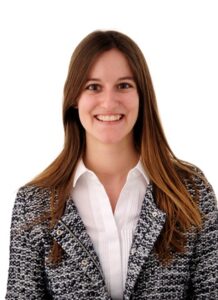Julie Didier is Marketing and Communication Manager at LuxFLAG.
Could you describe briefly your background and role within LuxFLAG?
In my current role as Marketing & Communication Manager, I am responsible for the planning, the development and the implementation of LuxFLAG’s external communications to promote the association’s activities in supporting Sustainable Finance. My tasks go from the preparation of strategic and operational marketing and communication materials to LuxFLAG’s online presence, press relations and the organization of events such as our quarterly breakfast seminars – and we are looking forward to our next breakfast seminar which will be organised together with InFiNe.lu on 1st of March.
Concerning my background, before joining LuxFLAG as a trainee in 2015, I completed my Master degree in Marketing and Communication Management from the University of St. Gallen in Switzerland. My Master thesis focused in particular on the online communication of sustainable companies.
Could you describe the work done by LuxFLAG in inclusive finance? And what makes it different from the other inclusive finance actors?
LuxFLAG is fully dedicated to inclusive finance and sustainable finance in general through the award of independent quality labels to responsible investment products. Already in 2006, LuxFLAG was created to support the Microfinance industry in Luxembourg. Today, we are still the only Microfinance label in the world, labelling more than half of global assets of worldwide Microfinance Investment Vehicles. We are a transparency initiative, a non-profit association built as a public-private partnership. We deliver the framework for making investments in microfinance reliable through an in-depth analysis of MIVs. The label permits investors to be sure that the investment funds to which they commit their money to, are actually investing substantially in microfinance. I believe that LuxFLAG significantly helped creating the necessary trust in the market and helped to make Luxembourg a preferred domicile for MIVs domiciling today more than 60% of global assets.
What is your key interest in inclusive finance?
 In my opinion, inclusive finance is a building block to achieve the Sustainable Development Goals, especially SDG1 and SDG2: no poverty and zero hunger. During my time at university, I had the luck to be involved in a humanitarian project in Java, Indonesia. It struck me how many people live under the poverty line. The rural project we did made me realize that people were only able to make a true change to their situation if they constructed things by themselves, if they get this feeling of self-achievement and not being imposed how to live their lives. If we don’t give people the chance and means to make a transformational change on their own, it will be difficult to achieve the socially related SDG. Microfinance exactly does that, empowering people and letting them create their own business and future. Inclusive finance is a key piece to solving the puzzle. I believe that the financial sector has a key social and environmental mission and as a result a meaningful impact can be created through finance.
In my opinion, inclusive finance is a building block to achieve the Sustainable Development Goals, especially SDG1 and SDG2: no poverty and zero hunger. During my time at university, I had the luck to be involved in a humanitarian project in Java, Indonesia. It struck me how many people live under the poverty line. The rural project we did made me realize that people were only able to make a true change to their situation if they constructed things by themselves, if they get this feeling of self-achievement and not being imposed how to live their lives. If we don’t give people the chance and means to make a transformational change on their own, it will be difficult to achieve the socially related SDG. Microfinance exactly does that, empowering people and letting them create their own business and future. Inclusive finance is a key piece to solving the puzzle. I believe that the financial sector has a key social and environmental mission and as a result a meaningful impact can be created through finance.
What are the biggest challenges for inclusive finance and how Luxembourg and InFiNe.lu can contribute to it?
There are still more than 2 billion unbanked adults in the world, so there is still much room for improvement. Luxembourg is already contributing a lot, with 1% of the GDP going to Official Development Assistance and having multiple actors dedicated to inclusive finance. To bring it even more to scale, we need to further raise awareness. Education plays a fundamental role to it. We need to educate from an early stage onwards that finance is a powerful tool that should be used for good
I think that climate change is one of the biggest challenges for inclusive finance in the future. We might face massive forced migrations from coastal to rural sides due to the aftermath of climate change, people will lose their homes and need to rebuild their existence. Inclusive finance will be even more needed. But one must say that Microfinance has been a very innovative sector, that needs to continue thinking out of boundaries, and it will help keep up with new challenges we face on national and international level.
InFiNe is the Luxembourg platform that brings together public, private and civil society actors involved in inclusive finance. The value of InFiNe lies in the wide range of expertise characterised by the diversity of its members.
With the support of

Inclusive Finance Network Luxembourg
39, rue Glesener
L-1631 Luxembourg
G.-D. de Luxembourg
Tel: +352 28 37 15 09
contact@infine.lu
R.C.S. : F 9956
Legal notice
Privacy notice
Picture 1 © Pallab Seth
